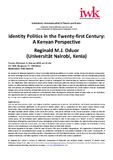| dc.description.abstract | Over the past four decades, ethnic and religious minorities, organisations of persons with disabilities, and feminist organisations among
others have contributed significantly to the growth of identity politics, that is, competition for state power among interest groups.
Nevertheless, many centralist regimes continue to suppress this mode of political expression through a “nationalist“ discourse.
This paper examines identity politics in the twenty-first century, with special reference to the Kenyan experience. It observes that the
dominant variety of identity politics in Kenya is ethnically-based, with more than forty-two ethnic groups competing for state power.
Consequently, Kenya is a multi-ethnic state forcefully created by colonialism rather than a nation-state formed by a largely homogenous
cultural group. Yet the dominant public political discourse continues to refer to the country as a “nation“ or even a “nation-state“.
Furthermore, although the Constitution of Kenya promulgated in 2010 to some extent acknowledges the right of ethnic groups to pursue
their aspirations within the Kenyan polity, the elites of dominant ethnic groups continue to publicly castigate the articulation of ethnic
interests while simultaneously executing political strategies based on those same interests.
The central argument of the paper is that for most of Kenya’s fifty years of political independence, the suppression of ethnically-based
politics among the non-dominant ethnic groups has significantly contributed to socio-political instability in the country. Consequently, it
proposes that Kenya’s long-term political stability is dependent on a shift from liberal democracy with its focus on the atomic individual to
a mode of democracy that takes cognisance of the ethnic loyalties of the bulk of the country’s population | en_US |

